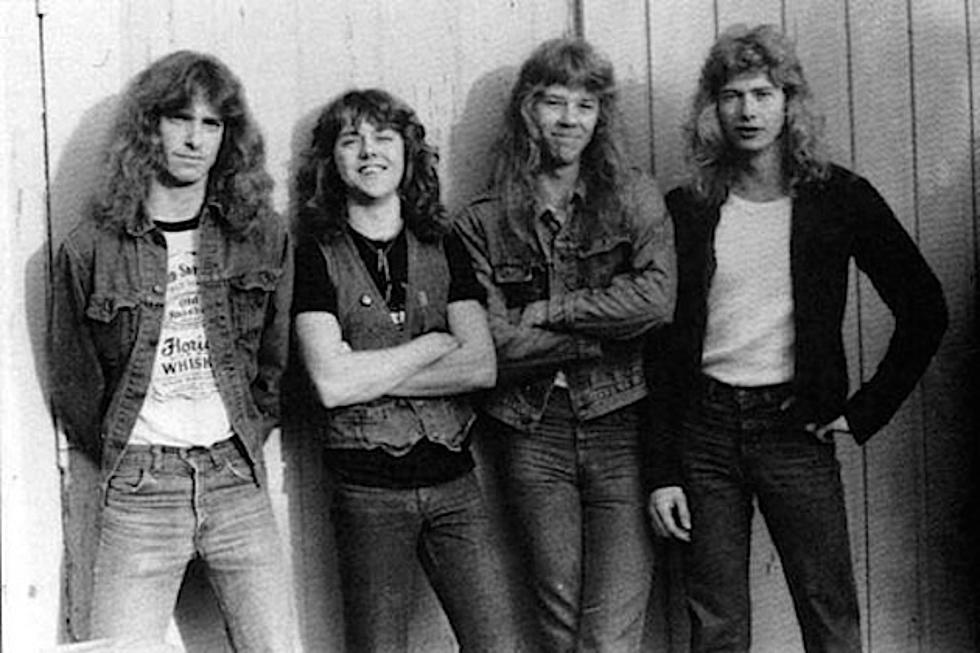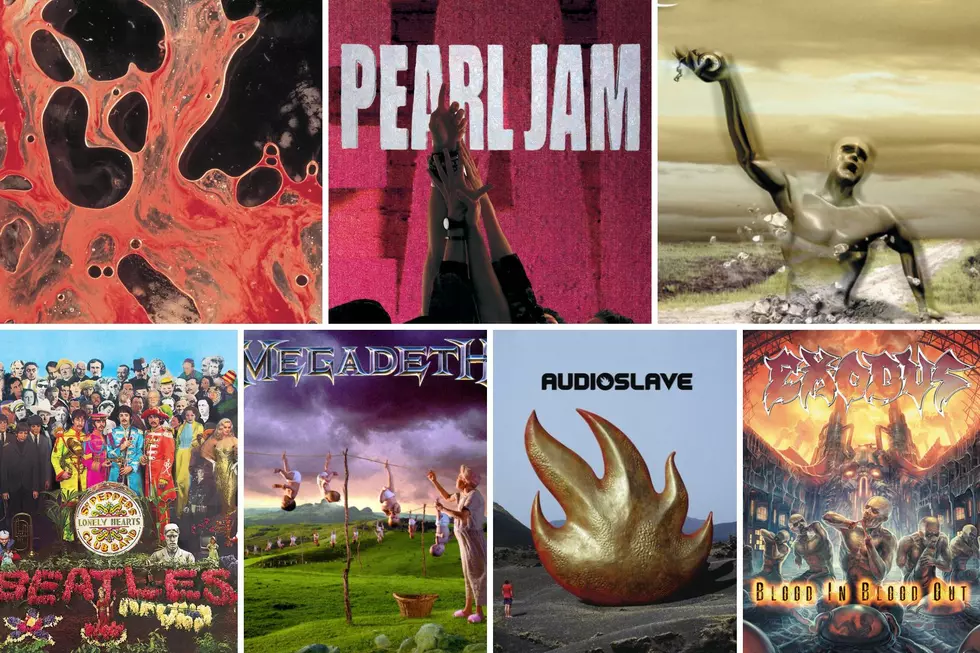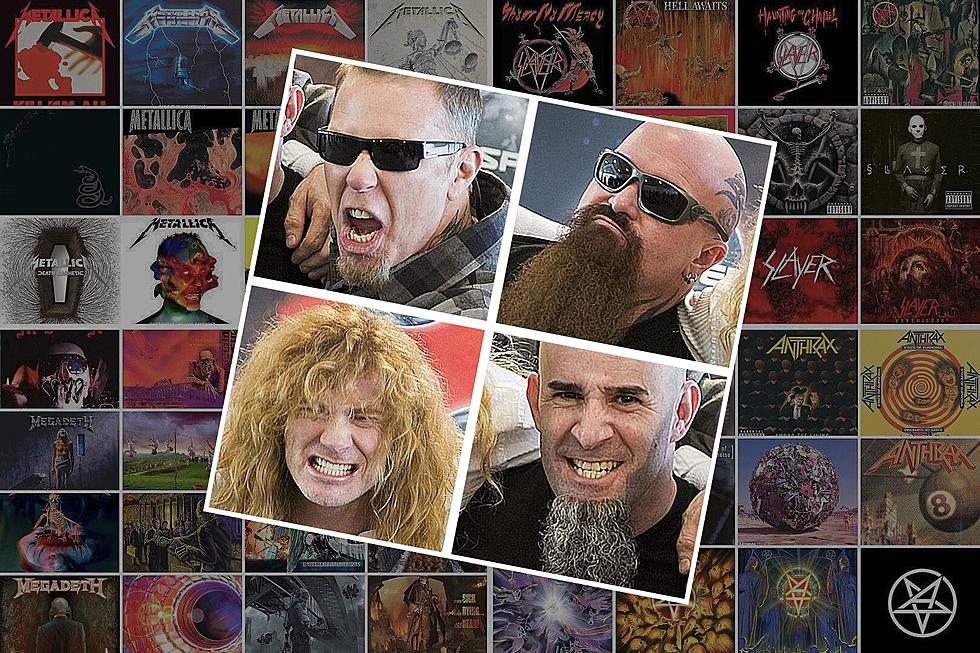
Megadeth’s ‘So Far, So Good… So What': Their Underrated Masterpiece
Thirty years ago, metal was in great shape; check out our list of The Best Metal Albums of 1988 to refresh your memory. I'd argue, though, that Megadeth's So Far... So Good... So What! -- released on Jan. 19, 1988 -- belongs on any list of the best records, of any genre, of that year.
So Far... So Good... So What! foreshadowed the path that metal, and loud guitar rock in general, would take over the next few years. Historically, punk rock and metal mostly existed in separate camps, but that was changing as thrash bands brought an underground hardcore influence to the genre. The Sex Pistols were one of the most famous bands from the '70s punk rock explosion, and on So Far... So Good... So What!, Megadeth covered "Anarchy in the U.K." with the help of Pistols guitarist Steve Jones.
In the coming months and years, bands like Jane's Addiction, Soundgarden and Helmet would seriously blur the lines between punk and metal, and every loud rock band was claiming punk influences. But Megadeth was ahead of the curve: "Anarchy" was also the album's lead single and video, and was a very conventional sounding rock song, giving it wider appeal than most of the Megadeth catalog. But since it was a cover of one of the most notorious bands of all time, no one accused Megadeth of selling out.
There was another important aspect of So Far... So Good... So What! that made it stand out: frontman and songwriter Dave Mustaine laid his emotions bare in a way that was more common to hardcore punk than metal, particularly on "In My Darkest Hour." The song was written after Mustaine learned that his former Metallica bandmate Cliff Burton died; as he told The Onion's AV Club, "I started crying and I went straight to Los Angeles downtown and bought heroin and I wrote the song in one sitting." The song's lyrics didn't seem to be specifically inspired by Burton, although Mustaine's frame of mind was surely influenced by his friend's tragic death. "In My Darkest Hour" is simultaneously one of Mustaine's greatest songs (possibly his greatest) and also, it's very hard to listen to.
It begins, "In my hour of need / Ha, no, you're not there / And though I reached out for you / Wouldn't lend a hand." This was unlike anything you'd heard in metal at that time (with the possible exception of hardcore crossovers Suicidal Tendencies). It would have been impossible to imagine Iron Maiden, Slayer, Testament or the pre-therapy Metallica addressing a dark night of the soul with this much vulnerability. But heavy metal was, and is, is a genre for outsiders, and when you're an outsider, true friends and lovers are harder to find, because your pool of potential friends and lovers is, by definition, smaller. So betrayal stings even more. You felt Mustaine's pain as you listened.
"Did you ever think I get lonely?" Mustaine asks. "Did you ever think that I needed love? Did you ever think, stop thinking, you're the only one that I'm thinking of?" In 1988, it's likely that only metalheads (and maybe a few punks) were listening to Megadeth, but anyone suffering heartbreak can identify with these painful lyrics. Still, the song would get even darker.
"Things will be better when I'm dead and gone," Mustaine chillingly moans. "Everlasting life for me / In a perfect world / But I got to die first / Please God send me on my way."
I remember being profoundly moved by the song when I first heard it. I was also worried for Dave Mustaine; Megadeth's first two albums, 1985's Killing's My Business... and Business is Good! and 1986's Peace Sells... But Who's Buying? were both modern classics. I wanted him to have a long career, like Ozzy or Alice Cooper. I hoped he wasn't feeling those lyrics too literally.
Beyond that, I hoped that this song wouldn't find itself mired in a controversy similar to Ozzy Osbourne's "Suicide Solution" or Judas Priest's "Beyond the Realms of Death" and "Better By You, Better Than Me," where young people claimed to be influenced by those songs to attempt suicide. The Parents Music Resource Center was targeting the genre, and while none of those songs actually encouraged suicide, that would not matter to a grieving parent who felt that their child was triggered by a song. It also wouldn't look good in the court of popular opinion.
I'm glad that the song wasn't the last track on So Far.... In 1988, albums were still albums (not playlists) and you tended to listen to the whole thing in order (particularly if you purchased it on cassette). So, before you finished digesting "In My Darkest Hour," you were assaulted by the following song, "Liar," one of metal's most powerful takedowns. It's kind of a thrash version of Bob Dylan's brutal "Positively 4th Street." Mustaine starts off by growling, "You take great pride in never having lived up to anything: lie, steal, cheat and kill, a real bad guy." That's as polite as it gets.
He goes on to tear down the subject's family in the least sensitive (and, unfortunately, homophobic) terms. But if you were still feeling depressed from the previous song, all you needed to do was bark along with the breakdown: "Start trouble, spread pain / Piss and venom in your veins / Talk nasty, breathe fire / Smell rotten, you're a liar / Sweat liquor, breathe snot / Eat garbage, spit blood / Diseased, health hazard / Scum bag, filthy bastard / Greasy face, teeth decay / Hair matted, drunk all day /Abscessed, sunken veins / Rot gut, scrambled brain / Steal money, crash cars / Rob jewelry, hock guitars / Rot in Hell, it's time you know / To your master, off you go / You're a liar, a fucking liar! / Filthy liar! Liar! / You fucking liar! Liar!"
"In My Darkest Hour" shares hard truths and stares down at the dark abyss, while "Liar" allows for much-needed venting (although it would have been better without the homophobic lyrics, and I wonder if Mustaine regrets them today).
The album finishes with "Hook in Mouth," Mustaine's creed against the aforementioned P.M.R.C.: "A cockroach in the concrete, courthouse tan and beady eyes / A slouch with fallen arches, purging truths into great lies / A little man with a big eraser, changing history / Procedures that he's programmed to, all he hears and sees / Altering the facts and figures, events and every issue / Make a person disappear, and no one will ever miss you!" Ouch.
The last words we hear from Mustaine at the end of the song are: "I'm not a fish! I'm a man! Hook! In! Mouth!" It's the perfect ending to one of his most furious songs, but also for the album as a whole; it was worth noting that the album wraps not with surrender, but with a fight. It's also worth noting that the man who wrote those lyrics is still here today, making new records and playing huge shows to die-hard fans. We can all be grateful, then, that he successfully got through his darkest hour and lived to tell the tale.
Megadeth Albums Ranked
More From Loudwire









